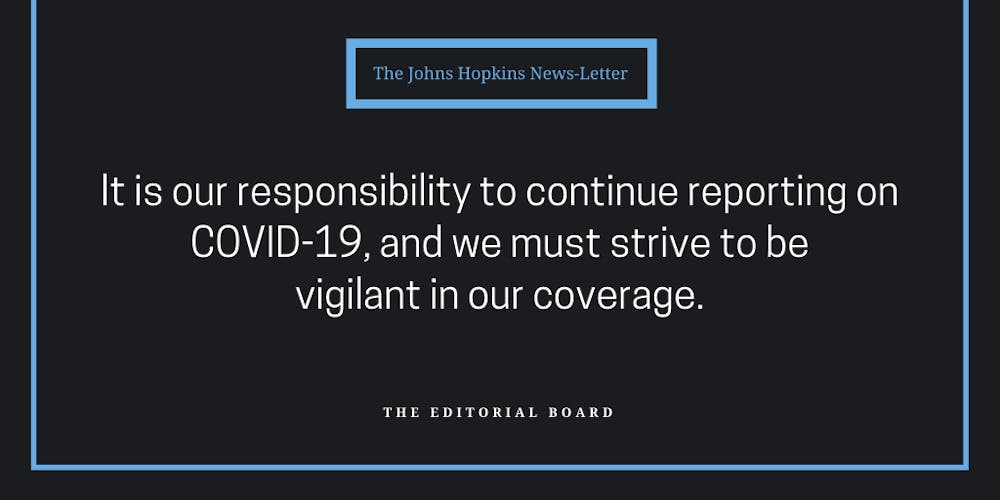Last week, The News-Letter published, deleted and retracted an article about a Hopkins faculty member’s presentation on COVID-19 data.
The piece, “A closer look at U.S. deaths due to COVID-19,” was published on Nov. 22 and covered a webinar presented by Genevieve Briand, the Assistant Director for the University’s Applied Economics Advanced Academic Program. Briand analyzed COVID-19 death figures from the Centers for Disease Control and Prevention (CDC) for the United States. She argued that there had been no increase in U.S. deaths in 2020 compared to previous years. She also claimed that deaths from other causes have been miscategorized as COVID-19 deaths.
On Thursday, Nov. 26, the Editors-in-Chief learned that the piece was being shared by conspiracy theorists on social media to deny the severity of COVID-19. Additionally, readers contacted The News-Letter stating that there were factual inaccuracies represented in the piece.
The Editors-in-Chief decided to delete the article because of these urgent concerns, explaining on social media that the piece was being taken out of context and used to spread dangerous misinformation. While the article noted the need for further research, this sentiment was not sufficiently emphasized. We failed to clarify that Briand’s analyses have not been published, peer-reviewed or verified by outside experts.
However, the article should not have been deleted in the first place. Instead of temporarily removing it from our website, The News-Letter should have immediately retracted and provided a detailed explanation of the inaccuracies in Briand’s research. We did not intend to silence Briand; instead, we sought to put her claims in conversation with findings from Hopkins, the World Health Organization and the CDC.
Early Friday afternoon, the Editors-in-Chief wrote an Editor’s Note in consultation with the Managing Editors, which was published with an accompanying PDF link to the original article for the sake of transparency. The Editor’s Note was meant to, albeit belatedly, clarify why the article was retracted and contextualize Briand’s claims with those of leading public health experts.
Over the last week, our readers have questioned how and why this article was published and whether it should have been retracted or left standing.
We want to clarify that the issues with the article are not the fault of our reporter, and we want to reaffirm our support for her as a member of our staff. All articles undergo a review process, with section editors and copy readers conducting fact checks for each piece. It was an oversight that the piece was published without appropriate fact-checking and context.
The leadership of The News-Letter takes responsibility for this situation. The article shouldn’t have been published without the additional information needed to put Briand’s research into perspective.
We also want to stress that we are an independent newspaper. Some mistook The News-Letter for an official University publication, while others accused Hopkins of censoring us. However, The News-Letter is an editorially and financially independent, student-run publication. The University does not control our content and did not influence our decision to retract the piece.
The article and its aftermath have led us to reflect on how we can avoid a similar situation in the future. It is our responsibility to continue reporting on COVID-19, and we must strive to be vigilant in our coverage. Articles about the pandemic can have life or death consequences, especially as cases rise across the country and misinformation spreads across social media.
One way to combat this misinformation is to implement a fact-checking process that involves research from multiple sources. Additionally, the editors of the Science & Technology section — where the piece was originally published — have compiled a list of guidelines for future articles concerning COVID-19, with the goal of ensuring that our paper upholds the highest standards of reporting. This includes requirements that scientific claims are supported by peer-reviewed sources and are verified by experts in that field.
We sincerely apologize for how this article was handled, and we invite continued feedback on our coverage. We welcome Letters to the Editor and commit to continuing the conversation around COVID-19.
We must continue to hold ourselves accountable, and we appreciate all the readers who have helped us do so. The News-Letter recognizes, and is grateful for, the trust you place in us, and we will do all we can to continuously earn it.
Editor’s Note: The Editorial Board consists of the Editors-in-Chief, the Managing Editors, the Opinions Editor and a rotating editor from sections other than News & Features.
The News-Letter encourages Letters to the Editor and op-eds as ways for members of the community to express their opinions in a formal manner (as opposed to online comments, which do not appear in the paper). The News-Letter reserves the sole right to edit all op-ed pieces and/or Letters to the Editor for grammar, clarity, accuracy and style. This applies to the body of the submission as well as its headline. Upon approval for publication, all op-eds and Letters to the Editor become property of The News-Letter. The News-Letter reserves the right to not publish any op-ed or Letter to the Editor for any reason, at the sole discretion of the Editors-in-Chief. All submissions may be published online as well as in the paper, and no anonymous submissions will be accepted. Submissions with factual inaccuracies will not be published.
Letters to the Editor are limited to 400 words, must address an article previously published in The News-Letter that school year, and must include the author’s name, email address and phone number. They should be sent to chiefs@jhunewsletter.com with “Letter to the Editor” in the subject line.
To write an op-ed, contact the Opinions Editor at opinions@jhunewsletter.com with a short pitch. The Opinions Editor will provide the writer with a word limit.
Submittal of an op-ed and/or Letter to the Editor acknowledges your acceptance of and agreement to these policies. Any questions about these policies should be directed to the Editors-in-Chief of The News-Letter at chiefs@jhunewsletter.com.





